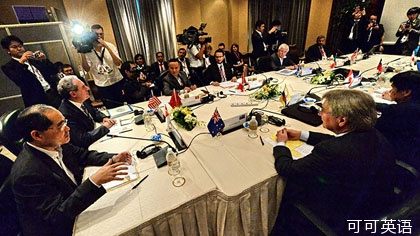(单词翻译:单击)

Deep divisions over TPP as US pressures to close controversial deal.
美国通过施压关闭有争议的交易在跨太平洋贸易协议产生严重的分歧。
Trade ministers and representatives attend the Trans-Pacific Partnership (TPP) Ministerial Meeting in Singapore on December 7, 2013. (AFP Photo / Roslan Rahman)
2013年12月7日贸易部长和代表出席了在新加坡的跨太平洋伙伴关系(TPP)部长级会议。
The US is ramping up pressure to secure a Trans-Pacific Trade Deal with conditions that could undermine the national interests of nations involved. WikiLeaks documents say talks are “paralyzed,” with the US refusing to compromise on disputed issues.
美国正在加强压力,以确保一个可能涉及损害他国国家利益的跨太平洋贸易协议通过。维基解密文件称,因为美国对争议问题据不妥协,造成会议“无法进展”。
Anti-secrecy group WikiLeaks has released two documents revealing the state of negotiations for the Trans-Pacific Partnership (TPP). The deal in question includes 12 countries – the United States, Japan, Mexico, Canada, Australia, Malaysia, Chile, Singapore, Peru, Vietnam, New Zealand and Brunei – which represent more than 40 percent of the world’s gross domestic product.
反保密集团维基解密发布了两个文件揭示了跨太平洋伙伴关系协议(TPP)谈判的状态。有问题的交易包括12个国家 - 美国,日本,墨西哥,加拿大,澳大利亚,马来西亚,智利,新加坡,秘鲁,越南,新西兰和文莱——占全球国内生产总值(GDP)的40%。
The 12 nations are in Singapore this week to discuss the trade agreement. Following a closed-door meeting in Singapore, Japan's trade minister Yasutoshi Nishimura told press he would like “the United States to show flexibility.”
上周,这十二个国家在新加坡讨论贸易协定,继在新加坡的一个闭门会议后,日本经济产业大臣西村泰敏告诉记者,他希望“美国表现出灵活性。”
"I've already mentioned the parts we can't budge on, so the issue is what both sides can do based on that,” Nishimura said.
“我已经提过我们不能让步的部分,所以在此基础上双方可就此事讨论。”西村说。
Details of the deal had been hidden from the public eye until last month when WikiLeaks divulged a trove of information describing the ins and outs of the agreement. Washington has been criticized for not revealing the details of the agreement.
该交易的详情本已经逃过了公众的眼睛,直到上个月,维基解密泄露出来的协议文件交代了了此次交易的来龙去脉。华盛顿一直被批评没有披露该协议的细节。
WikiLeaks’ files show that there is significant disagreement over 119 outstanding issues, with the US refusing to compromise on a number of contentious issues. It is not clear from which of the 12 countries participating in the talks the leaks came.
维基解密的文件表明,美国在一些争议性问题上拒绝妥协,双方在119项重要事务上有严重分歧。关于12国参与讨论文件的泄漏来源并不清楚。
“The US is exerting great pressure to close as many issues as possible this week,” reads one of the documents. “One country remarked that up until now there had been no perceivable, substantial movement on the part of the US, and that is the reason for this situation.”
“美国正在不断施压,试图在本周尽可能多地结束分歧。”一个文件中如此记载。“一个国家谈道,到目前为止美国方面还没有任何可见的实质性动作,这是造成如今状况的原因。”
The Obama administration has called on all parties involved in the deal to reach an agreement before the end of the year. However, disputes over key issues may lead to “a partial closure scenario or even a failure in December.”
奥巴马号召有关各方在年底前达成协议。然而,12月份就关键议题的争端可能导致“一个半拉子方案或者谈判失败。”
The deal has been hailed by Washington as a “number one priority” that will boost the economies of all the participating countries. But some of the conditions have sparked criticism that the nations involved in the deal may see their interests undermined.
TPP协议被华盛顿鼓吹作加速所有参与国经济的“不二选择”。但是其中部分条款引发了损害其他国家利益的批评。
Among the issues blocking the agreement stipulates new powers for multinationals that would allow them to challenge country laws in privately run international courts. Washington has endorsed such powers in previous trade deals such as the North American Free Trade Agreement (NAFTA), but conditions in the TPP could grant multinational more powers to challenge a wider range of laws. Under NAFTA several companies including Dow Chemicals and Exxon Mobil have sought to overrule regulations on fracking, oil drilling and drug patents.
一些阻碍谈判的争议性条款中规定了跨国公司的新权力:允许通过商办国际法庭来挑战国家法律。华府曾经在其他商贸协定例如北美自贸区谈判中推行过这个权力,但在TPP条款中跨国公司将被赋予更广泛的挑战法律的权力。在北美自贸区协定中,一些公司如陶氏化学和埃克森美孚,曾试图否决关于水力压裂法、石油钻探和药品专利的管理条例。(译者注:水力压裂法是将水或沙等注入岩层以抽取天然气的方法,主要用于页岩气开采,由于大量耗水以及污染地下水等潜在问题目前对此褒贬不一)
“The United States, as in previous rounds, has shown no flexibility on its proposal, being one of the most significant barriers to closing the chapter,” said a memo from one of the participating countries obtained by the Huffington Post.
赫芬顿邮报获得的一个参与国的备忘录中如此写道:“就像之前的几轮谈判一样,终结这一分歧部分的最大障碍正是美国在提案中毫不妥协的态度。”
Furthermore, among the rumored conditions in the treaty are new standards that would grant pharmaceutical companies new intellectual property rights. The regulations would extend patents, giving companies monopolies on new medications and potentially pushing up prices in the developing countries participating in the deal.
不仅如此,传言中其他一些条款包含授予制药公司知识产权的新标准。条例规定延长专利期限,赋予制药公司对于新药的垄断权,潜在地推高参与TPP的发展中国家的国内药品价格。
“If instituted, the TPP’s IP regime would trample over individual rights and free expression, as well as ride roughshod over the intellectual and creative commons,” said WikiLeaks founder Julian Assange in a November statement. “If you read, write, publish, think, listen, dance, sing or invent; if you farm or consume food; if you’re ill now or might one day be ill, the TPP has you in its crosshairs.”
维基解密的创始人阿桑奇在11月的声明中说:“TTP一旦建立,知识产权制度将会践踏人权和言论自由,恣意欺凌有识之士。”“只要你阅读、写作、出版、思考、倾听、舞蹈、歌唱或者发明;只要你生产或者消费食品;只要你身患疾病或者将会生病,你就已经在TPP的准心之中了。”
Rights groups have also voiced their opposition to the treaty and slammed reforms that they say would limit freedoms on the web. Organization Open Media have launched a petition against the TPP’s “extreme online censorship” and have already collected over 100,000 signatures.
右翼团体也已经表达了他们对条约的反对,抨击在他们看来会限制网络自由的改革。开放媒体发起了反对TTP“极端网络审查”的请愿,他们已经收集到了超过十万个签名。


